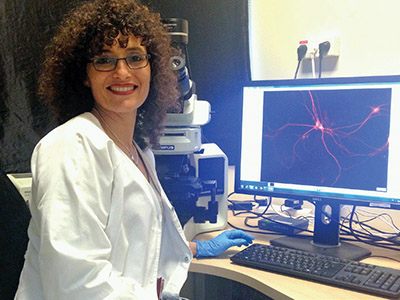
(Courtesy of Sheba Medical Center)
“Despite the occasional headlines that a pill or a cure for Alzheimer’s is right around the corner, the truth of the matter is that scientists and researchers are still far away from finding a miracle pill or cure. Why? Because the brain is by far the most complex organ in the universe and there are so many things we still need to discover and research,” revealed Michal Beeri, professor and director of the Joseph Sagol Neuroscience Center at Sheba Medical Center in Israel and professor of psychiatry at Mt. Sinai Hospital School of Medicine in Manhattan.
Professor Beeri is at the forefront of innovative research in determining the cause of dementia and Alzheimer’s, with a major focus on people who suffer from diabetes and the metabolic syndrome, which have been determined as key triggers of dementia and Alzheimer’s.
“Alzheimer’s is a neurodegenerative disease caused by a cascade of biological triggers that we don’t fully understand,” she claimed. “The brain is protected by a blood-brain barrier which maintains communication between the body and central nervous system. It is a highly sophisticated system that it’s almost impenetrable.”
However, doctors and researchers discovered that people who suffer from chronic diabetes have double the risk of developing dementia and a faster rate of cognitive decline. Those who develop diabetes at middle age have an even higher risk of developing dementia at old age.
Professor Beeri, who has been funded by the National Institutes of Health (NIH) in the USA for two decades, added that “well-designed clinical trials” that improved lifestyle (such as physical activity) together with enhanced intensity of cognitive activities, showed that patients who have high risk of dementia displayed marked improvement in risk.
Which means there is cause for optimism and hope for the general population in preventing the onslaught of dementia and Alzheimer’s.
“Studies have shown that people who engage in physical, social and cognitive activities on a regular basis stand an excellent chance of postponing the onset of dementia,” said Professor Beeri. “The benefits for the average person and the public health system are enormous because if you can delay this debilitating disease simply by changing your lifestyle, doctors and hospitals will have less patients to treat, not to mention the personal and societal benefits involved.”
Which physical sports does Professor Beeri recommend to maintain a healthy body and mind?
“The sweatier, the better—especially aerobic-type sports, which raises your heartbeat. Yoga and stretching have not shown the same benefits as sweaty sports activities,” she divulged.
“The sweaty sports activities spur various other mechanisms, including the oxygenation of your brain. The blood flows more effectively cleans out toxins. Exercise in general triggers other chemicals in your brain creating the birth of new neurons, which communicate with each other. People who don’t exercise or don’t use their brains enough within cognitive functions have higher risk of synaptic dysfunctions, where neurons don’t get enough info from each other and eventually die, which will eventually cause dementia and Alzheimer’s. Bottom line, keep yourself out of your comfort zone, eat healthy, exercise, use actively your mind, be involved with your family and community. That’s the best prescription for being of sound mind and body even into very old age.”
The cure for Alzheimer’s might be far away but we still have the power to stave off the disease.










